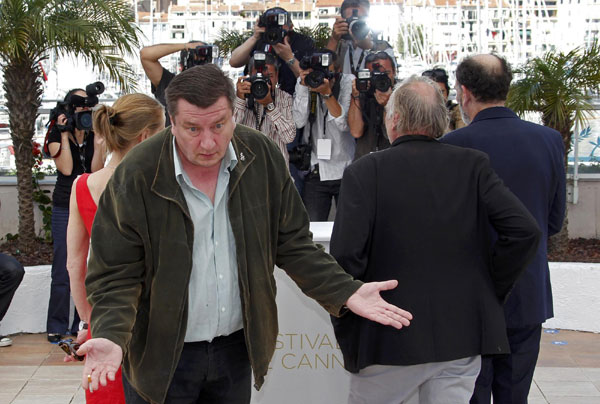Finnish fairytale wins fans, Cannes films warm up
 |
|
Director Aki Kaurismaki gestures as he poses with cast members (L to R) Kati Outinen, Blondin Miguel and Jean-Pierre Darroussin, during a photocall for the film "Le Havre" , in competition at the 64th Cannes Film Festival, May 17, 2011.[Photo/Agencies]? |
Finnish director Aki Kaurismaki tackles the tough theme of illegal immigration in his touching fairy tale "Le Havre," launching on Tuesday in Cannes where enthusiasm for the competition films is hotting up.
After a sluggish start dominated by somber tales, critics and journalists filing into the Grand Theater Lumiere cinema for early morning screenings have a spring in their step again as 2011 begins to live up to expectations of a strong year.
Kaurismaki's movie about an old man who sets out to rescue a young African boy from the French authorities in the northern port city of Le Havre was loudly applauded at the end of a packed press screening.
The director said his vision of the world was far darker than the one portrayed in "Le Havre," which is full of humor, tenderness and painterly beauty.
"I was about 10 years old when I found myself disappointed (with life) so I decided to fake that I am not and I started to create hope for others because they still have some," he said.
"The more skeptical and cynical I get the more soft are my feelings. I can't help it. I start to be tender in my old days and I start to even like my characters," he added in English at a press conference, where he was in a sardonic mood.
In "Le Havre," Andre Wilms plays Marcel Marx, a former author who scrapes a living as a shoe shiner and is part of a close-knit local community in a run-down part of town sharing a modest home with his wife Arletty.
His life is thrown upside-down when Arletty falls seriously ill and a young refugee turns up on his doorstep, setting in motion an increasingly desperate bid to help him cross the Channel to England and reunite with his mother in London.
POLITICIANS "NOT TOO INTERESTED"
Asked about his stance on the issue of refugees and economic migrants coming to Europe, he replied: "The problem is of course huge and I honestly don't have an answer.
"If the politicians would come out of their hotel rooms they might have a solution, but they don't seem to be too interested in common life between the hotel room and (the) Mercedes."
The sets and characters in Le Havre are taken straight from the 1950s and 60s, although the presence of mobile phones and the appearance of news footage of the closure of the refugee camps in the last decade come from a later period.
The dialogue often sounds like it is straight out of a novel, and aging French rocker Little Bob steals the show with a performance. Kaurismaki called him the "Elvis" of the region.
Le Havre is the 11th of 20 competition entries in Cannes this year, and could be among the frontrunners to win the coveted Palme d'Or for best picture which is awarded on Sunday.
Also popular among critics in a notoriously difficult event to second guess are Belgium's Dardenne brothers, who could become the first directors to win Cannes three times with "The Kid With a Bike."
French black-and-white silent film "The Artist," a bold throwback to the pre-sound era of cinema, is seen as a contender as is Terrence Malick's sweeping "The Tree of Life" starring Brad Pitt, which has divided festival goers like no other movie.
 0
0 






